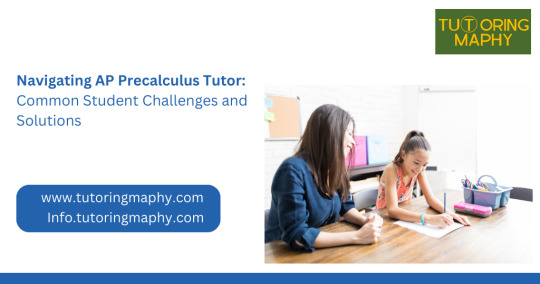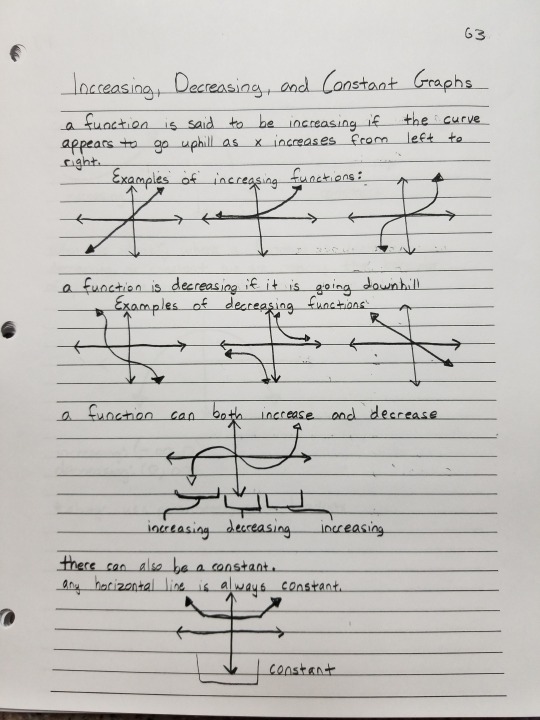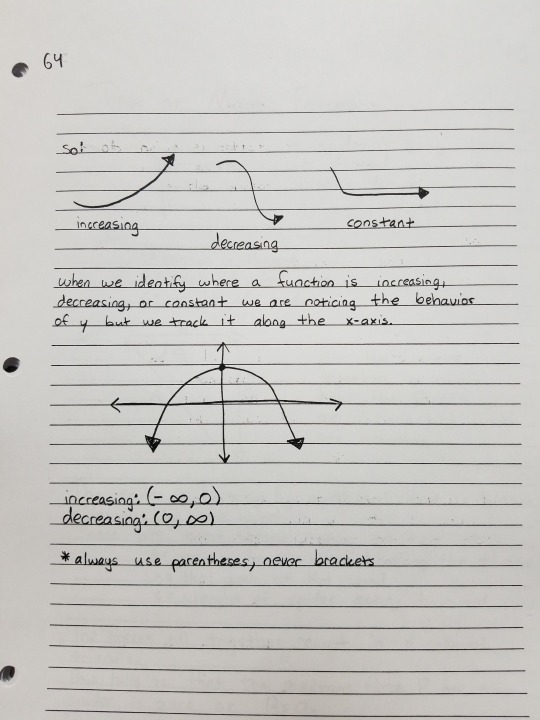#graphs in precalculus
Explore tagged Tumblr posts
Text
Horizontal Translation of Logarithmic Functions
-- Formulae: -> g(x) = logb (x + c) -> g(x) = logb (x - c)
-- g(x) = logb (x + c) shifts the graph of f(x) = logb (x) to the left c units and moves the vertical asymptote to x = -c
-- g(x) = logb (x - c) shifts the graph of f(x) = logb (x) to the right c units and moves the vertical asymptote to x = c
.
Patreon
#studyblr#notes#math#maths#mathblr#math notes#maths notes#mathematics#algebra#logarithms#logarithmic functions#functions#functions in math#mathematical functions#pre-calc#pre-calculus#precalc#precalculus#algebra formulas#precalc formulas#precalculus formulas#formulas#formulae#logarithms in math#logs in math#math logarithms#asymptotes#graphing#graphs#graphing in math
3 notes
·
View notes
Text
have a math quiz tmrw might cry (or disappear into the woods for an undisclosed amount of time)
funniest part is that math is my favorite subject 🥲
#mathematics#school#homework#precalculus#i swear who has a quiz on the SECOND week of school#we haven’t even done any math yet#it’s freaking graph analysis#i don’t like graph analysis#give me an equation and i’ll love you give me a graph and i might punch you
3 notes
·
View notes
Text
i am absolutely one hundred percent going to completely bomb this math test holy shit. i hate you trigonometry i hate you graphing i hate you proofs i hate you precalculus. i dont hate the unit circle though the unit circle has never done anything bad for me
6 notes
·
View notes
Text
Precalculus Functions and Graphs by Franklin Clemens 1992 Hardcover Second Ed. 9780201567311 | eBay

Precalculus (1992)
1K notes
·
View notes
Text
Book Ed1 - here — Precal 2
Book Ed2
By @sock-to-the-third (18+ blog)
Parabolas
Inequality
Exponents
.
Unit 0: Pre-Algebra
.
Algebra
Unit 1: Solve for x
Unit 2: Inequality
Unit 3: Exponent
Unit 4: Graphing
Unit 5: System of Operations
~
Algebra 2
Unit 6: Functions
Unit 7: Radicals
Unit 8: Imaginary Numbers [21]
Unit 9: Trinomial
Unit 10: Logs
Unit 11: 1/x
Unit 🍎 : Growth & Decay b^x
Unit 12: (f + g)(x)
Unit ��: Parent Functions
~
Precalculus
Unit 13: Inequality
Unit 14: Composite f(x)
Unit 15: Inverse f(x)
Unit 16: Radicals
Unit 17: Parabola
Unit 18: Power of i
Unit 19: Power Function
Unit 20: Dividing Polynomials [50]
Unit 21: Dividing Polynomial Functions
Unit 22: Tough 1/x
Unit 23: Basic 1/x
Unit 24: b^x
Unit 25: Graphing Logs
Unit 26: Circles [70]
Unit 27: Ellipse
Unit 28: Parabola
Unit 29: Hyperbola
0 notes
Text
5
Joyce was feeling paranoid in her room, which was on the second story. Her walls were coated with the hottest of pinks and covered in various art pieces which spelled out the way that she felt throughout the years. Mostly paintings of flowers and landscapes, she appreciated the complexity of flowers. As she looked down she saw the work put before her. A study sheet, for her precalculus final, which was to take place in a couple of days, and beside it, her Adderall. She opened the box of pills and inside there were none. She closed it again.
She checked the locks on her door and her windows and made sure there was no chance that her isolation could be broken, and then she checked the box again. Still nothing. She got out her phone and began looking at Snapchat, which was her preferred method of getting more pills. She hadn’t had one all day and it was getting a little hard for her to focus. She texted her dealer, Rufio, and waited for a response. While she was waiting she checked the pill box again. Still nothing.
Rufio responded complaining about the late hour that she was asking him to deliver. He said he would do it, but only if he got a $10 delivery fee in return. Joyce agreed and Rufio was on his way.
Outside Joyce’s window was a slanted roof which gave way to a sort of pathway that could be taken to the ground. It was a dangerous way to have the house set up when they were kids, but it was very convenient now that she used it to sneak out. She saw Rufio’s car at the gate and unlocked the window. She grabbed $110 and put it in her back pocket, and opened up her window, climbing out and making her way to the ground, where she would begin to run toward Rufio and open the gate. She got in the passenger seat of his car and held the money in her hand. The deal was made and she went back to her room.
She dumped the bag of pills into her box, took out three, and began crushing them. She didn’t bother to look at the dosage of the pills before beginning her routine. She crushed them up in a dime bag that she’d been using and reusing for 2 years now, which was coated all throughout the inside with a fine particulate that couldn’t be retrieved except with water. She dumped the powder out onto a hand mirror and snorted it using a piece of a plastic straw.
She began to study with her newfound energy. She was starting to get better at making her graphs, which was good because that’s kind of what calculus is all about. She was finished with the tenth problem when she decided that she’d reward herself with more Adderall.
First / Prev / Next
0 notes
Text
Navigating AP Precalculus Tutor: Common Student Challenges and Solutions | Tutoring Maphy
Navigating AP Precalculus: Overcoming Common Student Hurdles with Expert Guidance
Introduction:
Embarking on the journey through AP Precalculus can be both exhilarating and daunting for students. As they delve into advanced mathematical concepts, they often encounter various challenges that can hinder their progress. However, with the guidance of a skilled AP Precalculus tutor, these obstacles can be overcome effectively. In this article, we'll explore some of the common difficulties faced by students in AP Precalculus and how working with an experienced AP Precalculus tutor or online calculus tutor can lead to academic success.

Understanding Complex Concepts:
One of the primary challenges students encounter in AP Precalculus is grasping complex mathematical concepts. From trigonometric functions to conic sections, the course material can seem overwhelming at first glance. However, with the assistance of a knowledgeable AP Precalculus tutor, students can break down these concepts into more manageable chunks. Tutors can provide personalized explanations, offer real-world applications, and present alternative problem-solving strategies to enhance understanding.
Mastering Problem-Solving Techniques:
Another obstacle students face is mastering problem-solving techniques. AP Precalculus often requires students to apply various methods and formulas to solve equations, graph functions, and analyze data. Without proper guidance, students may struggle to identify the most effective approach for different types of problems. An AP Precalculus tutor can offer valuable insight into problem-solving strategies, providing step-by-step guidance and practice exercises to reinforce learning.
Overcoming Test Anxiety:
Test anxiety is a common issue that can significantly impact student performance in AP Precalculus. The pressure of exams, quizzes, and assessments can lead to stress and apprehension, causing students to underperform even if they understand the material. Working with an AP Precalculus tutor can help alleviate test anxiety by instilling confidence and providing targeted preparation techniques. Tutors can administer practice tests, offer constructive feedback, and teach stress-reduction strategies to help students perform at their best on exams.
Managing Time Effectively:
Time management is crucial for success in AP Precalculus, as students must balance coursework, homework assignments, and exam preparation alongside their other academic and extracurricular commitments. However, many students struggle to prioritize tasks and allocate sufficient time to study effectively. An AP Precalculus tutor can assist students in developing effective time management skills, creating study schedules, and setting realistic goals to stay on track throughout the course.
Utilizing Online Resources:
In today's digital age, online resources play a vital role in supplementing traditional classroom learning. However, navigating the vast array of online resources available for AP Precalculus can be overwhelming for students. An online calculus tutor can help students identify reputable websites, instructional videos, and interactive tools tailored to their individual learning needs. Additionally, online tutors can leverage virtual whiteboards, screen-sharing capabilities, and other digital tools to facilitate remote learning sessions and enhance student engagement.
Conclusion:
Navigating AP Precalculus can be challenging, but with the support of an experienced AP Precalculus tutor or online calculus tutor, students can overcome obstacles and achieve academic success. From understanding complex concepts to mastering problem-solving techniques and managing time effectively, tutors play a crucial role in guiding students through their AP Precalculus journey. By investing in personalized tutoring, students can build confidence, improve performance, and unlock their full potential in AP Precalculus and beyond. For more, visit us: https://tutoringmaphy.com/ap-precalculus-tutor/
Visit us - www.tutoringmaphy.com
Read our blogs - https://tutoringmaphy.com/blogs/
Contact us - [email protected]
Follow - https://www.youtube.com/@tutoringmaphy
___________________________________________________________
0 notes
Text
Why I'm learning Blender
In mathematics, we often work in detail with shapes and lines. We analyze slopes, intercepts, and confined areas in order to create a mathematical picture. Because of this, from the second we start to teach mathematics, we use images and graphs. To show that the sum of two and three is five, we might draw a representation of the numbers as cookies or apples. To show that the slope of a parabola at its vertex is zero, we might plot some points and connect the dots.
As a senior in college studying mathematics, I have found myself drawing countless graphs and diagrams of the shapes and formulas I have been working on. Even when dealing with abstract concepts, I use a combination of colors and points to explain what is happening. When tutoring precalculus, my first method of explaining a concept is always a drawing.
Bettina Rosken and Katrin Rolka did research through the University of Duisburg-Essen, Germany, that shows the importance of visualization in mathematics regarding calculus. They state that “visualization allows for reducing complexity when dealing with a multitude of information,” (Bettina and Rolka 458). Being able to see a graph and label every important point allows students to keep their work clear and concise. The authors, however, make a point that a drawing or representation of the mathematical concept only does so much; a mathematical model cannot stand by itself without an understanding of what it is and its rules.
While math is best learned in a classroom, Blender, a 3D modeling program, can be one of those tools that can help assist in understanding concepts outside of class time. As much time as I can spend on drawing a graph of a 3D shape like a donut, more commonly known in the math world as a torus, if I can instead learn a program that allows me to hold two keys down and click through some interface to place a torus into a world, then I can push my understanding of mathematics even further in less time.
And that is what I have done. So far, I have spent time learning how to place shapes, edit the world around them, and their materials. While I will not need to necessarily be able to create a sphere that is reflective in order to understand a math problem, the more I understand the entire interface and abilities of Blender, the better I will be able to use it. Understanding both what to use and what not to will allow me in the future to focus further on the mathematical side of this program and how I could have used it in the courses I have taken. This week, the final project I made was a lighthouse on a rock with some small houses around it. I learned how to sculpt different shapes, create different light sources, and assign different colors to different faces. All of this was thanks to Grant Abbitt’s course on Udemy with GameDev, titled Complete Blender Creator: Learn 3D Modeling for Beginners.
Rösken, Bettina, and Katrin Rolka. "A picture is worth a 1000 words–the role of visualization in mathematics learning." Proceedings 30th conference of the International Group for the Psychology of mathematics education. Vol. 4. Prague: Charles University, 2006.

1 note
·
View note
Text
youtube
AP Precalculus MCQ #3 Which of the following functions has a zero at x=3 and has a graph in the
0 notes
Text



today is the day that all my school grades have been released, so i only have to wait until july for my report card. i went to debate camp and i made friendship bracelets, something i haven't done for three years. for my second precalculus class, i did my readings, which are about graphing trig and inverse trig functions. i also made myself a chocolate chip mug cake <3
#pink academia#academia#y2k#hot and educated#med studyblr#medicine#med school#med life#high school#studyblr#pink aesthetic#pink#study aesthetic#study inspiration#studyspo#study notes#study motivation#pink academic#light pink#aesthetic#studying#study blog
0 notes
Text
is a survey of calculus hard
Survey calculus is one of the easiest calculus subjects students can take, it is made for students who are majoring in branches like economics, business, psychology, social science, etc. In other words meaning the majors that don’t focus a lot on math, not like engineering, mathematics, or physics.
These are the 7 main topics that students take and Survey car colors:
Precalculus review
Functions and graphs
Limits and continuity.
Introduction to differentiation and basic rules for differentiation.Implicit differentiation and related rates.
Use of derivatives to study absolute maxima/minima and to sketch graphs of functions.
The constant e and continuously compounded interest.
Integration: indefinite integrals and anti-differentiation, definite integrals, and the Fundamental Theorem of Calculus determining area between curves, integration by parts.
So, General business majors are advised to take read more...
0 notes
Text
I'm not familiar with San Francisco specifically, but at my tutoring jobs it's fairly common to see students take a generic "nth grade math" class through grade 7 or 8 until getting to algebra. I get the impression that these courses talk about, like, fractions, and a bunch of concepts from more advanced math at a surface level, like graphing or linear equations or similar triangles.
I got on the named-math-class ladder in 5th grade due to weird schooling situations, but at my high school in California, the 'default' sequence for people who hadn't been held back but had only taken the minimum of math classes was:
9th grade: Algebra I
10th grade: Geometry
11th grade: Algebra II
12th grade: no math or Precalculus
so not taking algebra in middle school seems plausible.
California/San Francisco is cool because it's like, the richest place in the world and is inhabited with people who I think mostly share my values but somehow every policy I hear about is terrible
186 notes
·
View notes
Photo


#studyblr#notes#my notes#algebra#algebra notes#college algebra#college algebra notes#pre-calculus#pre-calculus notes#pre-calc#pre-calc notes#precalculus#precalculus notes#precalc#precalc notes#graphs#graphs in precalc#pre-calc graphs#precalc graphs#precalculus graphs#pre-calculus graphs#graphs in pre-calc#graphs in precalculus#graphs in pre-calculus
22 notes
·
View notes
Text

5/26/19
this was my math final study guide. it was something that’s for sure. it literally took FOREVER
comment down below if you see the secret message :))
xo- gg
#ggsstudies#xo- gg#mine#math#math finals#precalc#math notes#note taking#study guides#review guides#finals#finals season#precalculus#pencil#graphing calculator#precalc notes#studyblr#studyspo#study motivation#studygram#studyspiration#study#studying#student life#life of a student#q
122 notes
·
View notes
Photo



10.5.18
these are literally the nicest math notes i’ve ever taken in my whole life. also, note to self, academic coffee makes a really good hot chocolate. on top of that, here are some nice lights from the main building on campus.
listening to: my pace - stray kids
#bujo#math#math notes#study#studyblr#kpopstudynet#hot chocolate#academic coffee shop#academic coffee#lights#lamps#trigonometry#precalculus#graphing#graphing notes#muji#muji pens#coffee shop#*original
192 notes
·
View notes
Text
Algebra 2 - here - Book Ed1
Precalculus 1
Book: Precalculus 2e, Abramson, Jay, OpenStax, 2021
Transformations / Trig Review + 7.1
Unit 1
Review / Algebra 2 Cheat Sheet
Parent Function: D & R
Set Builder Notation
Piecewise Function
^Tough Example I x I
Unit 2
Function Operations
Decomposing
Composites
Inverse Function
Review
Unit 3 [Book Notes]
Parabola Basics
Switching Between Formats
Quadratic Word Problem
Imaginary numbers
#imaginary review
Complex Conjugate Solving
Complex Plane / Solving i^#
Power Function (3rd degree +)
Graphing Polynomials (pg1)
*Power function is a format of polynomials
Unit 3 [Class Notes]
Imaginary / Quadratic Formula
Polynomial Functions (include end behavior and D/R)
Note: there weren’t any word problems on the quizz. Also solving for a (sub n) was a significant part. Plus, make sure to write x-intercepts as ordered pairs.
Unit 4 [Book Notes]
Dividing Polynomials
Long Division
Synthetic Division
Word Problem
Finding Zeros
Remainder Theorem
Basic poly division
Factor Theorem
Poly division, factor, solve for x
Rational Zero Theorem
Find possible x-intercepts or zeros
Finding Complex Zeros
^ same, a>0
Unit 4 [Class Notes]
Long D v Synth D
Eq —> Zero, Zero —> Eq
Possible Zeros, p/q
Narrow Possible Zeros
Graphing always option
Complete Factorization
Sq Root Zero —> Eq, Vertex Form
Terminology
Complex Zero Dump
MID TERM REVIEW
Unit 5
1/x
Rational Functions
Graphing
Edit: D > N —> y=0 h.a.
D < N —> y = slant
D = N — y= a/b
Exponent
Decay and Growth
Graphing
Extra
Application Problems
Compound Interest v Continuous Growth
Logs
Common v Natural
Algebra 2 Solutions
Graphing Logs
UNIT REVIEW
*note: no interpretting graphs on quiz
.
Unit 6
Log/Exponent Rules
Expanding Logs
Ways to Solve
Application Problems
Graph —> Eq
No review
Hard part: solving exponents of different bases / richter scale application problem / decibel / newton’s law of cooling
.
Unit 7
Basic Circle
Circle Problems
NonStandard —> Standard
Ellipses
Parabola
*my book notes are a mess, so yeah… ignore them. Only listing classnotes on MP
UNIT REVIEW
0 notes